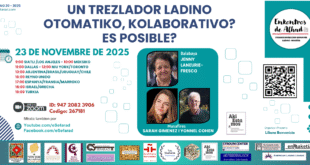
To celebrate the United Nations’ International Mother Language Day on February 21, the producers of the documentary Saved by Language are organizing a Judeo-Spanish Language Week online festival. Four recent films and one new audio project about the endangered language of Judeo-Spanish (Ladino & Haketia) will be available for free from February 21 to February 26 at: http://muestroespanyol.com/.
One of the goals of International Mother Language Day is to highlight the importance of preserving endangered languages. UNESCO estimates that half of the world’s 6000 languages are at risk of extinction, at the rate of one language dying every few weeks.
The purpose of the Judeo-Spanish Language Week online festival is to give people an opportunity to learn more about the endangered Judeo-Spanish language that originates from the Sephardic Jews expelled from Spain during the Inquisition. The language has two main variants: Haketia, originating from North Africa — a mix of 15th century Spanish with Arabic, Hebrew and French— and the Ladino dialects that developed in the Balkans and Turkey —a mix of 15th century Spanish with influences from Turkish, Greek, Hebrew, Arabic French and Slavic languages. The media in this series illustrate the rich tapestry of voices that make up the Judeo-Spanish language and Sephardic lifestyles from around the world.
Films in the Judeo-Spanish Language Week online film festival:
**Some of our films include subtitles in English and other languages.
Saved by Language (2014) by Susanna Zaraysky & Bryan Kirschen
Saved by Language tells the story of Moris Albahari, a Sephardic Jew from Sarajevo (born 1930), who spoke Djidió, his mother tongue, to survive the Holocaust. Moris used Judeo-Spanish to communicate with an Italian Colonel who helped him escape to a Partizan refuge after he ran away from the train taking Yugoslavian Jews to Nazi death camps. Additionally, by speaking in Judeo-Spanish to a Spanish-speaking US pilot in 1944 he was able to survive and lead the pilot, along with his American and British colleagues, to a safe Partizan airport. Join Moris as he reflects on his childhood and reunites with the last remaining speakers of Judeo-Spanish in Sarajevo today.
Las Ultimas Palavras (2015) by Rita Ender
Las Ultimas Palavras is a film about Judeo-Spanish’s current use among young Turkish Jews. The documentary focuses on 19 young Turkish Jews (ages 25-35) who were asked which Judeo-Spanish words they know; it will explore the reasons behind the death of a language that continues to exist primarily through song and cuisine. The documentary also reviews why the native language of many older community members can no longer be learned, the role of the language today, Jewish identity and the sense of belonging from the younger generation’s perspective.
It Never Rained on Rhodes (2014) by Barry Salzman
It Never Rained on Rhodes explores the loss of place, heritage, history, community, family and cultural identity. Through the lens of the last surviving Rhodesli Jews, including some who survived Auschwitz, and their descendants, the film considers fragmentation of life and community. The island becomes a metaphor for any place the viewer imagines it to be and the losses expressed by those in the film becomes the losses experienced by the audience. It is a multi-part installation project that explores collective narrative and the impact of a society’s destruction on memory and nostalgia.
Once Upon a Time at 55th and Hoover (2013) (to appear online as of Feb. 23) by Andrés Enrique-Arias
Once Upon a Time at 55th and Hoover tells the story of the Sephardic Jews from the island of Rhodes who arrived in Los Angeles in the first half of the 20th century and established a community in the area around 55th st and Hoover, what is today South Central Los Angeles. Through compelling interviews with two immigrants born in Rhodes and one second generation Rhodesli who grew up in the area we learn how the Sephardim of Rhodes, as all immigrants of that era, were torn between assimilating into mainstream American culture and maintaining their identity. The film is also a valuable historical document: filled with seldom seen movie footage and previously unpublished archival photographs it brings to life a little known aspect of the history of Los Angeles.
We will also feature an online audio project:
KHOYA: Jewish Morocco Sound Archive (2015 )by Vanessa Paloma Elbaz
KHOYA is a repository for the music and oral histories of Jewish Morocco based in Casablanca. It is structured in two sections: 1. Judeo-Moroccan music: commercial and field-recordings from sacred and secular repertoires of the Jews of Morocco and 2. Oral Histories: a collection of oral histories collected throughout Morocco about present and past facets of Jewish life as well as individual oral histories thus providing micro-histories within the general community. With the dwindling numbers of the Jewish population of Morocco since the 1950s, what was once one of the largest communities in the world has reached a small percentage of its original number. The Sound Archive aims to provide accessibility to a wide range of Jewish sounds and memories into the future.

 eSefarad Noticias del Mundo Sefaradi
eSefarad Noticias del Mundo Sefaradi

